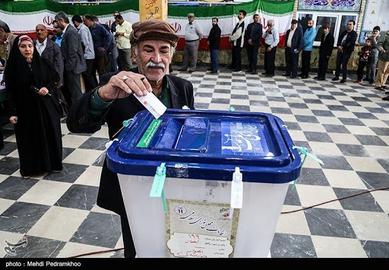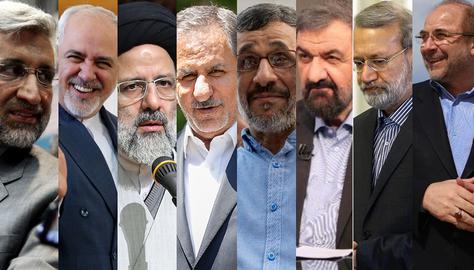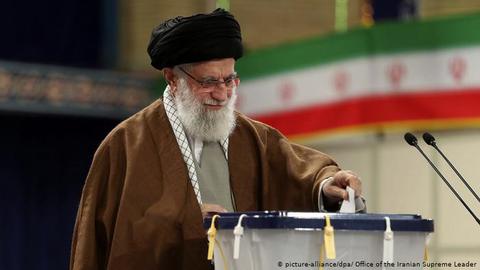In recent weeks, the phrase "coldest election" has been used repeatedly to describe Iran’s 2021 presidential election. This is because, as the June 18 election nears, there is no sign of an election mood: no politicians frantically vying for attention and support, no air of expectation. In fact, the main candidates have not even been announced.
This unprecedented situation has prompted some analysts to question whether this signals a change in the regime's strategy. It once pursued high levels of voting participation from the Iranian people, but could it be that now it is instead hoping for a low turnout with reliable results?
***
Rumors have been circulating about the "low-turnout, reliable results" strategy in recent months, particularly since the parliamentary elections in March 2020 witnessed a low turnout.
A day after the 2020 parliamentary elections and the official announcement of a 42 percent turnout, Fars News Agency attributed the unprecedented drop in participation "definitely and unequivocally" to the poor economic performance of President Rouhani's government. Its report focused particularly on the “mismanagement and carelessness of the president," rejecting any hypotheses presented by the reformists. Fars, which is closely linked to the Revolutionary Guards, was joined by other conservative-principlist websites in its criticism of Rouhani, while also acknowledging it was the lowest turnout in the history of the republic’s 11 parliamentary elections. They blamed the Rouhani government, and even blamed the widespread repression of the November 2019 protests on the government, despite this vioence being linked to Guards and security forces affiliated with the corps.
At that time, the reasons for the fall in participation were considered to be the increasing news about the spread of coronavirus as election day neared, the protests in November 2019, and in January 2020 after the shooting down of an Ukrainian passenger plane, and the widespread disqualification of candidates. In addition, Supreme Leader Ayatollah Khamenei, who has always been very sensitive to the "enthusiastic turnout" at the polls, essentially denied the reduced participation, and thanked the "massive turnout despite the biased propaganda".
"The negative propaganda started a few months ago and increased as the elections approached, and in the last two days, under the pretext of a disease and a virus, these media did not miss the slightest opportunity to dissuade people from participating in the elections," the Leader said.
A New Strategy?
Although some in the government and among the reformists saw the lowest turnout in parliamentary elections in 41 years as a warning for the 2021 election, others in the government and figures close to the Supreme Leader continued to disregard it. This led to questioning among the public: Had Iran’s regime changed strategy? Why is voter turnout no longer a priority for it? As the months went by, a range of theories and analyses investigated and debated the matter.
In December 2020, in one of the most explicit analyses, Mohammad Reza Zairi, a principlist cleric who had positioned himself as a critic of the regime for some time, claimed: "They seek minimum participation and maximum outcome, without concealing it or being ashamed of it."
Zairi concluded: "the system is now at a very crucial juncture,” a juncture that will either lead to "further restricting the people's choice" or "accepting the pain and bloodshed of a serious surgery" that will again restore a situation where there is widespread participation among the electorate.
This dichotomy was also raised in principlist media. Fars News Agency published an article entitled "Participation or Efficiency?"?, arguing that some believed that wherever there was high numbers of voting, the faction that is best at propaganda will win, “not necessarily the one who has a plan and program and record. So it is better, even at the cost of less participation, that those who have the will, the capacity, and the ability to run the government properly come to power.
"Perhaps it is more accurate to say that the efficiency-participation dichotomy is fundamentally wrong," the article continued. "The path to efficiency is through intelligent participation, but if for any reason this intelligence does not exist at any point, all the forces of the revolution must stand for participation, even at the cost of electing an individual or a government such as the one we have."
However, political expert Saeed Ajorlou told Farhikhtegan newspaper, which has become one of the most extremist principlist media outlets and is run by Al Akbar Velayati, "We must go in the direction of putting efficiency alongside participation as sources of legitimacy. That is, neither efficiency alone nor participation alone is useful; these two together can move us forward and solve the problems of the people and the political crisis, because there is a fault between the social forces and the political forces, and we now have a crisis of gaps and faults. We have to solve this in an efficient way. Of course, efficiency is sometimes achieved by a high number of voters and active participation."
In an interview with the newspaper Iran, Mohammad Ali Abtahi, a member of the Combatant Clerics Association, called the participation-efficiency dichotomy and "conscious choice" fundamentally wrong: "Basically, if a political faction fears a high turnout in elections and the political action of citizens, it shows its lack of self-confidence and that it cannot have the necessary social base."
In early March, however, Mohsen Armin, a reformist political activist, expressed his fears for the country during the annual assembly of the Islamic Association of the Medical Society. He described what the country was going through as a "crisis and sometimes even a super crisis" when it came to a range of issues. "The next presidential election is to be held on the basis of a lower turnout and a more reliable outcome," he said.
At the same time, some principlist figures denied there had been any change in priorities and strategies for the system or for Ayatollah Khamenei, calling the regime's first priority in elections as "maximum participation." They said any claim to the contrary is a "new deception by the reformist-moderate movement" to maintain their power in government.
A Priority for Rouhani
Amir Mohebian, former editor-in-chief of the Resalat newspaper, said that when it came to high participation reliable results, a group might prefer victory with a minimum level of participation. But the Supreme Leader is "completely opposed to this,” he said, and has always emphasized the high levels at which Iran’s electorate is involved in the process, regardless of the outcome.
In the last weeks of the last Persian new year, Hassan Rouhani reiterated how important high voter turnout is, and made it clear more than once that it was a priority for him. On January 31, he said he hoped for a 70 percent turnout. A few days later he quoted the Supreme Leader, who had reiterated in the local media “that popular participation is more important than the right choice; participation is the priority and the right choice is important."
This topic was again the focus in the Nowruz speeches of both Hassan Rouhani and Ayatollah Khamenei, prompting the government’s official news agency to publish a series of talks and articles on the matter. "Groups, intermediates, and aghazadehs [children of officials in power] who have tasted the fruits of minimal turnout and made big profits do not want a passionate election," said Mohammad Reza Tabesh in an interview.
Tabesh even claimed that by following "the case of luxury car dealers in Tehran, you can see that their roots are usually connected to individuals and organizations that benefit from a minimal participation."
Farhikhtegan newspaper had previously reported on a survey that suggested the presidential election of 2021 would likely witness one of the lowest turnout rates on record.
However, Iran’s conservatives hope that by engineering the candidates and the situation, they will be able to increase participation to some extent, while all the while feeling assured that their preferred candidate will be elected.
Related coverage:
Ahmadinejad Registers as Presidential Candidate
How will the Nuclear Deal Affect Iran’s Presidential Election?
As Presidential Candidates Register in Iran, How Does Vetting Work?
visit the accountability section
In this section of Iran Wire, you can contact the officials and launch your campaign for various problems



























comments